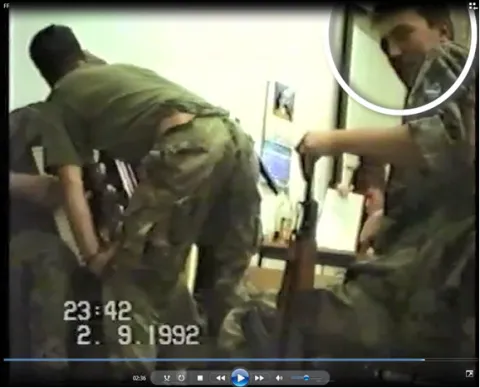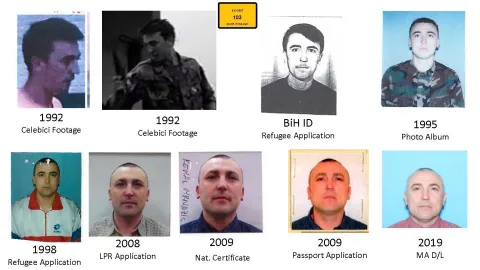Defendant concealed his involvement in the persecution of Serb prisoners at the Celebici prison camp in Bosnia
BOSTON — A Swampscott man was sentenced Jan. 22 in federal court in Boston after Homeland Security Investigations (HSI) uncovered a 25-year scheme to conceal his persecution of ethnic Serbs during the Bosnian War as well as making false claims to come to the United States and ultimately become a United States citizen.
Kemal Mrndzic, 52, was sentenced by U.S. District Court Judge Denise J. Casper to 65 months in prison to be followed by three years of supervised release. In October 2024, Mrndzic was convicted by a federal jury of engaging in a scheme to conceal his involvement in the persecution of Serb prisoners at the notorious Celebici prison camp in Bosnia in 1992; making a false statement to federal agents about his role at the camp; possessing a fraudulently obtained naturalization certificate and Social Security card; and using a fraudulently obtained passport and certificate of naturalization.
“Through the brave testimony of the survivors of the Celebici prison camp, the persecution Mrndzic attempted to conceal was finally brought to light after over 30 years. Though we can never undo what the survivors endured, I hope this sentence brings some measure of justice, no matter how long delayed,” said HSI New England Special Agent in Charge Michael J. Krol. “HSI remains tireless in our effort to pursue war criminals and human rights violators who attempt to evade justice.”
“For over two decades, Mr. Mrndzic evaded accountability for his participation in the persecution and torture of countless victims at the camp. By holding him accountable for his lies and fraudulent conduct, this sentence reinforces our resolve to ensure that those responsible for war crimes and human rights abuses are identified, exposed, and prosecuted. This case underscores that we will not allow our nation to be a refuge for those who seek to escape justice,” said United States Attorney Leah B. Foley. “The government will be working to ensure that his fraudulently obtained U.S. citizenship is revoked.”
Mrndzic served as a supervisor of the guards at the notorious Celebici prison camp in Bosnia and Herzegovina during the sectarian war which fractured the country in the 1990s. Twenty-one former detainees described Mrndzic as one of the most notable guards at the camp, who was widely known for his particularly vicious treatment of prisoners and his close association with the camp deputy commander. Mrndzic participated in the systematic and pervasive brutal torture and deprivation of basic human needs of hundreds of captive victims — some of whom were elderly — at the Celebici prison camp. For seven months, victims were forcibly detained with starvation rations, at times forced into lightless, airless manholes that were sealed for hours at a time. Victims also endured daily and nightly beatings that were administered by the guards at the camp — with baseball bats, wooden poles and rifle butts.
Camp survivors who testified at trial in October 2024 recounted murders, the burning of one detainee’s tongue with a heated knife blade, the wrapping of another detainee with a long explosive fuse cord and then lighting it on fire, sexual abuse and other harrowing acts committed over a period of many months. One survivor recounted the beating death of a 70-year-old detainee whom guards pinned a political party badge to his forehead while he was still dying. Survivors also testified about being starved and deprived of the most basic needs, including sleeping on the concrete floor of a sheet metal hangar for months on end while being fed only a slice of bread a day.

A United Nations tribunal investigated the crimes committed at Celebici and in 1998 convicted the two top commanders of the camp and one particularly sadistic guard on numerous crimes including murder and torture. While Mrndzic was interviewed by investigators in connection with that case in 1996, he was not charged by international authorities. Mrndzic subsequently concocted a scheme to leave Bosnia by crossing the border into Croatia and applying to immigrate to the United States using a fabricated story. In his immigration application and interview, he falsely claimed to U.S. immigration authorities that he fled his home after he was captured, interrogated and abused by Serb forces, and could not return home for fear of future persecution. As the government argued at trial, Mrndzic used his own experience as a persecutor to press a false narrative that he had been persecuted. He was admitted to the U.S. in 1999, and ultimately became a naturalized U.S. citizen in 2009.
Many Celebici survivors became refugees during and after the Bosnian War. Some came to the United States and have since become U.S. citizens. The survivors living in the United States played a central role in the investigation and prosecution of this case. They provided critical trial testimony and submitted moving victim impact statements.

The investigation was led by HSI New England’s Document and Benefit Fraud Task Force and HSI’s Human Rights Violators & War Crimes Center (HRVWCC) with assistance from the Social Security Administration Office of Inspector General’s Boston Field Office; the U.S. Department of State’s Diplomatic Security Service, Boston Field Office; and U.S. Customs and Border Protection, Boston Field Office. Additional support was provided by the Justice Department’s Office of International Affairs, U.S. Citizen and Immigration Services, DOJ’s Criminal Division’s Human Rights and Special Prosecutions Section and the U.S. Embassies in Sarajevo, Belgrade and Helsinki. The United Nations International Residual Mechanism for Criminal Tribunals (IRMCT) in The Hague, Netherlands, the Australian Federal Police, Bosnian and Herzegovinian Ministry of Justice, Serbian Ministry of Justice, law enforcement authorities in Finland and the Royal Canadian Mounted Police all provided valuable assistance as did the Cook County Sheriff’s Office in Illinois and the Swampscott Police Department in Massachusetts.
The HRVWCC is led by HSI and leverages the expertise of criminal investigators, attorneys, historians, intelligence analysts and federal partners to provide a whole of government approach to prevent the United States from becoming a safe haven for individuals who commit war crimes, genocide, torture and other human rights abuses around the globe. Currently, HSI has more than 180 active investigations into suspected human rights violators and is pursuing more than 1,945 leads and removals cases involving suspected human rights violators from 95 different countries. Since 2003, the HRVWCC has issued more than 79,000 lookouts for potential perpetrators of human rights abuses, and stopped over 390 human rights violators and war crimes suspects from entering the U.S.
